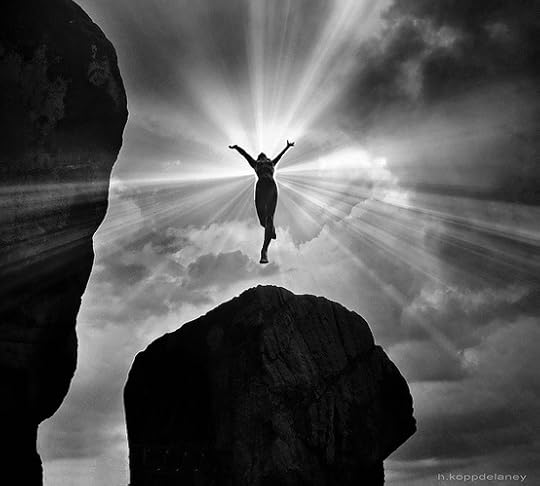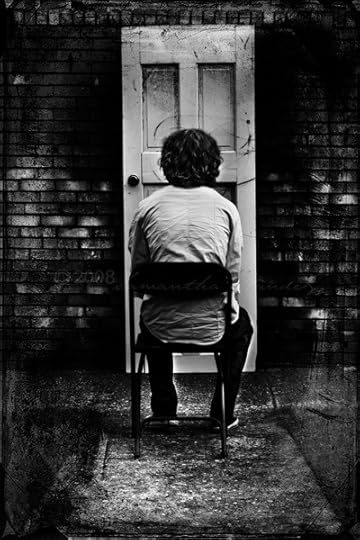Jim Palmer's Blog, page 75
March 31, 2013
It’s time to get a hold of your Self.
“It’s odd that religion often imagines a different and better world to come later, normally after death or some sort of apocalyptic end to our current world. Many people are anxiously awaiting the passing of this world in order to get to Heaven, the perfect place and paradise. But our world first appears as a paradise in the Book of Genesis and the Garden of Eden.
Why do we not see that the state of our world currently has been created and conditioned by our way of perceiving, understanding and being. Think of the impact Jesus had as one human being and 30-year life on earth. And yet Jesus said we would do greater things than he did. The big miracle is not escaping this earth; it’s transforming it.
It’s time to get a hold of your Self. In our lifetime there is only one person we must encounter, one person we must meet and know, one person we must be and express. That person is our essential Self, the true Self, the Self that was born out of the image, likeness and being of God. That Self that holds the kingdom of God. That Self that is united with God. The Self that was on display in and through Jesus.
Jesus made many “I am” statements about his Self, and Jesus intended us to identify our sense of Self in them. Jesus said in John 17, “The glory which you have given me, I have given to them; that they may be one, even as we are one.” And Paul said that we were meant to attain “the measure of the stature of the fullness of Christ.”
Think of this glory and fullness in the context of the “I am” statements and understand them as they relate to our own spiritual identity.
“I am the bread of life” is the “I am” of experiencing yourSelf as the completion of all spiritual desire and longing.
“I am the light of the world” is the “I am” of spiritual clarity, true perception – seeing things as they truly are, and the dissolution of all falsehood and illusion.
“I am the Door” is the “I am” of experiencing oneSelf as a channel through which the divine life and spirit flows.
“I am the Good Shepherd” is the “I am” of goodness and a bond and solidarity of humanhood, where every man is our brother and every woman is our sister.
“I am the Resurrection and the Life” is the “I am” of knowing oneSelf as pure eternal being – unthreatened, boundless, infinite, victorious.
“I am the Way and the Truth and the Life” is the “I am” of seeing oneSelf as complete and whole as an expression of the image, likeness and being of God.
“I am the Vine” is the “I am” of experiencing yourself as a source of spiritual energy to nourish, heal and strengthen what is weak or broken.
The world as it currently is has been created and conditioned out of a lot of spiritual ignorance, falsehood and illusion. What would happen if we claimed our true Self and began to operate within the reality of these “I am” statements that Jesus offered us? Maybe that’s what the scriptures means when they say that all creation moans, waiting for the sons and daughters of God to be revealed.”
- Jim Palmer, Notes From (over) The Edge


March 29, 2013
3 Things You Should Know About Becoming Yourself
3 Things You Should Know About Becoming Yourself:
1. You’re not broken (and you don’t need to be fixed)
We all take on certain ways of being for the purpose of coping with the world we grow up in. Some of these ways are beneficial, while others are damaging. But at the core of these behaviors is a need for protection, not brokenness. There is never going to be a time when you are “fixed” or fulfill that “ideal” version of yourself you have in your head. Living authentically involves continuing to grow, which is true for every human being, including Jesus (according to Luke 2:52).
2. Reality Is Always Better Than Comforting Myths
As crazy as it sounds, we actually find comfort in the myth that we are bad, defective, inadequate, helpless, and lacking. As Marianne Williamson wrote, “Our deepest fear is not that we are inadequate. Our deepest fear is that we are powerful beyond measure. It is our light, not our darkness that most frightens us.” However difficult it might be, it’s best to know the truth about ourselves and our lives, rather than be anesthetized by myths, whether they originated from your they family, culture or religion. Becoming Who You Are is about helping you find your truth.
3. You Can Figure It Out
We are often made to believe that we are not capable of guiding our own lives, or lack the inner resources to create the life we want. In one way or another, many people are in search of a “Higher Power” or external source to supply what we suppose we don’t naturally have themselves. Meanwhile, the Bible says, “We have everything we need for life and whole living.”
We are all unique people, and each of us experience life differently. What works for one person doesn’t necessarily work for another. No one can figure this out for us, and there are no one-size-fits-all formulas. Our charge is to discover what inspires us about our lives, what does work for us – to listen, trust and follow our own internal navigation system. That is one of the most significant milestones of the journey – trusting ourselves.


March 27, 2013
As soon as your eyes open each day, be Genesis 1.
“As soon as your eyes open each day, be Genesis 1.
In the beginning, God created from a space of formlessness and emptiness. Consider that this is how each day begins, formless and empty. Born out of the likeness and image of God, you are the creator of each new day. Where there is currently formlessness and emptiness, you bring things into existence that are currently not there, or only exist now inside you as something you know, think, see, feel, intuit, or desire.
You are not a victim of the world, you are the inventor of it. God continues to extend outward through you and your works of creation.
You are not a victim of the world you see because you created it in and through your thoughts, actions, ways of being, and the stories you have carried about yourself, God, others and life itself. Look around – this is the world you have made. The outer world as you see it is a manifestation of your inner world.
You are not a victim of the world you see, you can give it up as easily as you made it up, and you can create a new world in its place.
Consider this – there is another way of looking at the world and everything and everyone in it. You can shift your inner perception of yourself, God, others and life, and then see and create a whole other world that reflects it. You can give up the stories you have carried for too long and write new ones.
Consider this – that you can shift your perception of the world and see peace instead of what you see now.
Carry this thought and absorb it fully – every day is Genesis 1. Every day you wake up into a world that is formless and void, waiting for you to create it. The divine energy to create flows through you and is you. God is forever extending outward through you and your creations.
People pray, asking God to change the world, not realizing that they have created the world and have the power and authority to create something new. We pray for God to better the reality of our lives, not realizing that we have created our own reality and have the power to create something different.
You will fight this thought by telling yourself that your life is the way it is because of what other people have done or are doing, and that you never asked for the circumstances you have had to endure or are enduring in your life. It is true that you are not responsible for or to blame for the actions others take. But let this empower the thought of reclaiming your life, and generating a new life out of the goodness and beauty of who you are, and not what people said you were or made you feel you were.
It will mean something different for every person, but try on the thought that you have awakened into Genesis 1. Your world… life… and day is formless and void, and you have the opportunity to create it.
Let there be ________________.”
- Jim Palmer, Notes From (over) The Edge


March 25, 2013
“The meaning of life is just to be alive.”
“Alan Wilson Watts wrote, “The meaning of life is just to be alive. It is so plain and so obvious and so simple. And yet, everybody rushes around in a great panic as if it were necessary to achieve something beyond themselves.” We have difficulty comprehending and accepting these words, which is symptomatic of our woefully inadequate view of what life is.
Religion often doesn’t help the matter by focusing out attention on the afterlife, and more or less implying that attachment to the herelife is “worldly,” “ungodly,” and “sinful.” Religion’s apocalyptic view of the world’s end reinforces this further. Why bother if it’s all going up in smoke and flames anyway?
I find it interesting that Christianity puts tremendous emphasis on the birth of Jesus and his death/resurrection, and misses what happened in between… umm… like… his life! Joseph Campbell said, “We save the world by being alive ourselves.” We think of Jesus’ death/resurrection as the salvific part and forget that Jesus was saving the world all along by being alive himself, and showing us what this meant.
Harold Whitman wrote, “Don’t ask yourself what the world needs, ask yourself what makes you come alive, and then go and do that. Because what the world needs is people who have come alive.” Religion so often wants to stir up a lot of drama around what people must do for God, which has included such things as animal and human sacrifices, martyrdom, self-denial and self-flagellation. And yet the Apostle Paul said our walking-around daily life is our expression of “worship,” which is closing the loop of giving what has been given. You have been given a canvas and a set of art supplies – this is your life. What you put on the canvas, what you create – each color and shape and swoosh and swirl is your worship.”
- Jim Palmer, Notes From (over) The Edge


March 24, 2013
Truth… is.
“It may be that you are looking for truth too far away from yourself. You are never separated from truth. Consider that truth is not something to be found outside yourself, but something that permeates every molecule of who you are. Think of truth as something knit into your innermost being.
Just for a moment consider that you are so close to and inseparable from truth that for all intents and purposes, you are truth. I know, it sounds a bit crazy, maybe even downright blasphemous. But consider this is only because you have been so deeply conditioned to believe that truth is a thing somewhere out there and separate from you. Truth is not something outside to be discovered, it is something inside to be realized.
Truth is not the result of effort. Truth is not something you find at the end of some road. Truth is not a reward for being good. Truth is not a prize for those who are spiritual or intelligent.
Truth… is.
Truth is…
the way things are,
the way you are,
the way God is,
the way life is,
the way all things are.
Truth is experienced as…
a way of seeing… to see all things as they truly are
a way of perceiving… to perceive all things as they truly are
a way of being… to be all things as they truly are.
The real You already…
knows the truth,
perceives the truth,
sees the truth,
is the truth.
There is nothing left but for truth to condition your way of human being in this world. This is what there is for us to learn and take from the life of Jesus.”
- Jim Palmer, Notes From (over) The Edge


March 23, 2013
We have a diminished view of our humanity.
“We have a diminished view of our humanity. Even the typical “Christian” view isn’t even based in the Bible. Part of the problem is that we have driven a false wedge between “divinity” and “humanity.” This is a curious division since Jesus was both. Nonetheless, this false wedge more or less goes something like this:
Divinity = Good
Humanity = Bad
Divinity = God
Humanity = Something less than God
Divinity = Perfect
Humanity = Flawed
Divinity = Supernatural
Humanity = Natural
But human beings are made in the image and likeness of God. In other words, the God of Jesus is a supremely human reality. This means that God is not less human than humans, God is actually more human than humans. Our humanity is a derivative of God. God’s being is the source of our being. Our humanity doesn’t drag God down; God invites us into a humanity beyond what we are capable of imagining. Religion dumbs down our humanity, while Jesus elevates it. The title Jesus was most fond of was “son of man,” (ben adam), which is translated “the human one.”
Jesus said, “God is a spirit.” Just as the spirit of a master artist, sculpturer and gardener comes to expression in his canvass, sculpture or garden, so God’s spirit comes to expression in the things God has made, especially human beings who were created in God’s likeness. In the history of the world up until the time of Jesus, this image of God existed only in potential. Jesus actualized the human potential.
In Jesus, God’s image and likeness found full expression. Everyone who came within the sphere of his words and actions encountered this image and likeness of God. The earliest Christians were not quite sure what to make of this, and understandably so; they had never encountered another human being like Jesus. However, they were unified in their testimony that Jesus was “the image of the invisible God”, “the express image of God’s person.”
The ancients (and many still today) thought of God as an earthy monarch seated on his throne with people coming into and out of his presence in a very self-shaming manner. They thought of humans relating to God as a vertical authority, of Master over servant, Ruler over subject, Strong over the weak. But if Jesus was really like God, we confront a totally different reality – a supremely human God.
The people who came within the sphere of Jesus’s influence were moved to believe in a God who was with them, in them and for them, to heal, forgive and inspire them to face life with new hope and courage. Scheming tax collectors, hardened Roman soldiers, marginalized prostitutes, outcast lepers, all were made to feel that God was their accepting, loving, compassionate and empathetic friend.
Supremely human means that God is not only the source of our humanity, but that God is more human than we are. God is more loving, compassionate, kind, caring, just or anything else we recognize as being human. God is more sensitive to our rights to be free and human than we could possibly imagine. There is no imposed authority, no encroachment of our individuality, no interfering with our rights to make decisions even if they be wrong ones. Won’t God be the first to respect his image and likeness in us?
Religion has devoted so much time and energy, trying to understand God’s “divinity.” But where it has really fallen short has been in understanding God’s humanity, which is the basis of our humanity. Religion wants to cut Jesus down the middle, finding a human side and a divine side, but Jesus spoke of the two being one in him and as him. Jesus said, “I AM the truth,” and later explained that knowing the truth would set us free. What is this “I AM”-truth? Is it not that who and what Jesus was, is who and what we are?”
- Jim Palmer, Notes From (over) The Edge


March 22, 2013
4 things you may not need to be worrying about…
4 things you may not need to be worrying about as your spiritual growth and evolution continues:
1. Figuring “it” out
Reframe what it’s about going forward. There is no “it” to figure out. There is only love, peace, beauty, goodness, life, wholeness and freedom that is present inside you and IS you. Get acquainted with this… experience this… see, hear, taste, touch, feel this in everything and everyone… give expression to this. Relax, quit striving, be alive… be present… notice.
2. Defining your beliefs
Don’t be a slave to reductionism. It’s mainly a Western cultural phenomenon to insist on packaging up the infinite and unknowable into a system of intellectual ideas, propositions, concepts and beliefs. It’s a bonus if you can reduce it into a short creed or fit on the back of a church pamphlet. Look, if your previous way of approaching the divine had worked, you would not be where you are now. There’s likely a lot for you to unlearn, and the need to define your beliefs may be one of them.
3. Fitting into a label
People feel naked without a label. It’s just easier to have one. We often depend on our labels for a sense of identity and belonging. We all like the idea of belonging to a community or tribe and these are often attached to a label. Consider cultivating a sense of satisfaction and belonging by identifying with all of life and humankind as a whole. There may be no need to classify yourself with any more specificity than that. When someone asks me if I am a “Christian,” I will sometimes say something like, “Actually what I am is a human. And I identify with the humanity I see in Jesus, and the way he threw his lot in with all of humankind. I want to be more human the way Jesus was, and I want to inspire that kind of humanity all around me. I want to see God in myself and in every human being the way Jesus did, and I want to live in the reality that every person is my brother or my sister. I can’t imagine anything more divine than that.” My point is, it’s not necessary to identify or define yourself by a label.
4. Being wrong
God is not something to be “right” or “wrong” about. God is not a math test. Your true Self is as God created – secure, complete, whole, at peace, free, and fully aware of the truth. All that’s left is you giving birth to that Self in the context of human life, human living, and human being. You will never get there in fear, you can only get there in love. There is no fear in love. If you have fear, it’s an illusion you’ve created and has nothing to do with God and your journey here on earth. It’s one of the few rules of knowing God – Fear and God never go together. You will not lay hold of all God wants for you and IS you by carrying the fear of “being wrong” or “messing up.” When a child is learning to walk and they fall, are they “wrong” or “messing up”? You are 100% secure in God, and nothing ever has, ever is, or ever will threaten that.


March 21, 2013
Playing the Love Card
“An unforgettable quote from Les Misérables is, “Life’s great happiness is to be convinced we are loved.” The word “love” comes up incessantly in life and I sometimes wonder what it is exactly that we want when we express the longing to be loved. It seems to me that being “convinced we are loved” would mean that we experience ourselves as being accepted, worthy, wanted, desirable, beautiful, powerful, and valuable. Even if love is the essence of our identity, which I believe it is, our experience of love happens primarily in connection and relationship with others. The significance of Jesus for others was that he made God’s love believable and experience-able. Jesus did not send people off to a mountaintop to meditate on God’s love, or send them to church to study God’s love, or distribute theological pamphlets, explaining God’s love. Jesus gave expression to love… Jesus was love… his life was being love.
Because God is love, and because we were born out of the image, likeness, and being of God, our core identity is love. What this means is that each of us is carrying the most important card in life – the Love Card… the card that everyone else needs and is waiting for. There is no one on earth who has more power than you because you carry the Love Card, and playing it requires no special skill or knowledge.
I’d like to re-write Victor Hugo’s Les Mis quote this way, “Life’s great purpose is to convince others they are loved.” Just like the people of Jesus’ day, we don’t really “get” love unless we experience it. Just like they were, we also are love at the very center of our being, but we come to realize and experience this in relationship and connection with others. It’s a paradox that when we become expressions of love to others in the world that we invite an experience of love for ourselves, and come to know ourselves as love and loved.
The experience of love transforms people’s lives. Have you ever played a card game, and were waiting for that one card to find it’s way into your hand so you could win? It’s the same way in people’s lives, they need that Love Card. For so many people, the conditions of their inner world and lives are ripe for experiencing deep transformation and finding healing, freedom, and wholeness, but they lack the Love Card. They need that Love Card to find its way into their life. And guess what? It’s yours to give.
Consider this: whoever and wherever you might be, you are the Jesus that people need… the Jesus people have been waiting for… the expression of love they have longed to know and experience. You are the one holding the Love Card.
There is nothing more you need to do, become, learn, know, improve, or change to live a life of extraordinary meaning, purpose and significance. It’s no more complicated than this – expressing love, being love, playing the Love Card in whatever ways line up with the unique person that you are. It doesn’t have to look one way. Let it look your way, whatever that way is. Just accept that everyone you cross paths with in life is needing and waiting on the Love Card, and be aware that you are carrying it, and you are free to give it.”
- Jim Palmer, Notes From (over) The Edge


March 19, 2013
12 Areas To Unpack and Explore On Your Growth Journey Beyond Religion
12 Areas To Unpack and Explore On Your Growth Journey Beyond Religion:
1. Standing on your own two feet
(with a few new friends)
Taking responsibility for your spiritual journey; breaking free from the groupthink mentality; expanding your relational world beyond Christian sub-culture; acknowledging the fear, loneliness and self-doubt present after breaking free from religion; enrolling others in your new direction
2. Seeing things differently
(without things being different)
Dissolving the line between “sacred” and “secular”; seeing “God” in/as everything that is and unfolds in everyday life; being alive to the mystery, wonder, beauty and wisdom woven into the fabric of all of life
3. Cultivating a new relationship
(with yourself)
Unpacking the wonder, potential, power and possibilities of who and what you are; being your own new best friend; liking and loving yourself; being a fully expressed human being; “integrity” as a matter of alignment with your best/highest self
4. Accepting the lead role in the play called “My Life”
(without a script)
Letting go of the life script(s) you’ve been following; creating a new context for living; inventing your life; listening to and trusting your inner voice; taking on new ways of being
5. Seeing the divine in yourself and others
(reflecting back to you)
Looking past the labels and differences and seeing/relating to the deepest truth about every human being; shifting from an individualistic to collectivistic orientation toward life; relationships without judgment; the oneness of all humanity; we are all teachers and students; the interdependent nature of reality
6. Recognizing your divinity
(in your humaneness)
Our humanity is not an obstacle to spiritual living but the conduit; you are not an earthly being looking for spirituality to save, change, rescue, complete, compensate or escape you but you are a whole, perfect and complete being wanting to experience and express it in the context of the human reality and condition
7. Achieving enlightenment
(by not trying to get anywhere)
Being free from the goal of enlightenment; life as one present-moment at a time; not making things happen, but letting things happen; learning to be at peace; life without at attachment to preferences and outcomes
8. Becoming a geologian
(in harmony with earth, water, air and fire)
Unpacking the spiritual significance of the natural world; cultivating a connection with the classical elements; exploring the rhythm and flow of life in relationship to the phenomena of the physical world
9. Owning the fullness of your presence
(from the inside out)
Understanding the dynamics of our spiritual aura and energy; expanding what it means to truly be present where we are; understanding the connection of mind, body and spirit; redefining “ministry” and “mission” in terms of presence; being the change you desire in the world
10. Reframing your pain
(to transform your suffering)
The difference between pain and suffering; addressing the root of suffering; learning the lessons from our suffering; discovering and living true compassion for the suffering of others
11. Awakening your inner passion
(through procreation)
Expanding our understanding of procreation; reconnecting with that part of us that must create and give birth to art, ideas, products, services, etc.; deepening our relationship with the spirit of creativity; creativity as a manifestation of wholeness, springing from the weaving of spirit and matter
12. Expanding your notion of sexuality
(and reclaiming yours)
Expanding our notion of sexuality; being male and female; accepting ourselves as sexual beings; understanding the connection between spirituality and Eros and libido; sexual healing; being a fully-expressed sexual being; sexual exploration and intimacy and your partner.


March 18, 2013
The time to enter is now.
“Jesus bursts onto the scene with a message about a kingdom.
It is something new.
It is something that has already arrived.
The time to enter is now.
The announcement is called “good news.” It’s so good that the only proper response is to throw a party – a great celebration with lots of food and wine!
The “kingdom” is a new kind of human society. The only qualification required for entry is being a member of the human race. Being human is enough. Leave your titles at the door! Everyone has to enter this new society like a little child, which meant entering as one who had no great title, distinction or clout. It’s a kingdom of nobodies.
This is why Jesus declared that the destitute at the bottom of society were the truly lucky ones. They were already nobodies. They had nothing to lose. Consequently they were overwhelmed by the extraordinary generosity of the invitation. Becoming part of this new kingdom was much harder for those at the top of society. They were as welcome as anyone else, but they had to enter without regard to their titles of honor, wealth or power. They had to enter as little children, as nobodies.
In the new community of the Jesus society there is no discrimination. There are no high ranks or low ranks. No masters and servants. No clergy and laity. No rulers. No chief apostles. No gurus. All skin colors, all ethnic and cultural groups – all are equally welcome and share the same standing. Gender makes no difference because both male and female are equally human.
In this new kingdom there is no hierarchy. No imposed authority; only the authority of love. No groveling to superiors or condescending to inferiors. It’s not a “staff-led” community – it just all people together as one. Just love which knows no up or down, but a laughing, level playing field at this banquet of human liberation.
Religion doesn’t hold weight either. There is no religious test. Whether one believes in baptism by dunking, baptism with a water pistol or none at all is irrelevant. Neither good opinions concerning religion or bad opinions have any bearing on the matter of admittance or exclusion.
Other than the one evil of not being human (forgiving, caring, compassionate, giving, etc.) there is no sin.
The Jesus society shares in a common purpose: to live and die in the service of humanity, to work unceasingly for the liberation of every oppressed human being.”
- Jim Palmer, Notes From (over) The Edge














